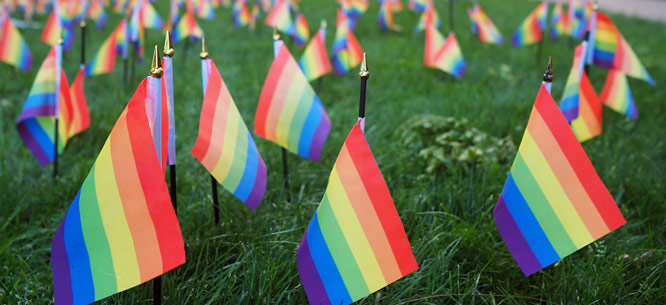The Two Sides of Hate
The Two Sides of Hate
Omar Mateen’s horrific mass murder last week in Orlando and Donald Trump’s vicious campaign for president both signal an alarming return of sadism in American life.

The late philosopher Richard Rorty once credited the protest movements of the 1960s and ‘70s with one singular achievement: reducing the amount of sadism in American life. Thanks to the welcome ruckus stirred up by civil rights, feminist, and gay liberation activists, women, LGBT people, and members of racial and ethnic minorities came to be treated more fairly and respectfully than ever before in U.S. history.
In much of the United States, that is still true—although most Americans probably don’t recognize the activists who helped catalyze the change. But more recently, sadism has come roaring back. During Obama’s first term in the White House, hate crimes surged in number, and the public sphere remains fouled by all manner of attacks on vulnerable minorities.
Omar Mateen’s horrific mass murder last week in Orlando and Donald Trump’s vicious campaign for president demonstrate the peril we face. The orange-maned billionaire and the Orlando killer—who both grew up in Queens—would have despised one another. But they shared a common animus: both assaulted—literally or rhetorically—groups of people to which they did not belong (although Mateen may have been seeking to purge his own gay desire) and whom they believed were mortal threats to an order that no longer exists.
Mateen imagined himself to be a soldier of the Islamic State. After his killing spree, an ISIS spokesman saluted him as such, although the terrorist had acted on his own, and we are still learning about the motives behind his attack. Trump appeals to the ugliest impulses in our political culture: racism, fear of immigrants, misogyny, contempt for civil liberties, and the hunger for a charismatic leader who will “make America great again” if we agree to let him wield the full power of the state. Those slaughtered at Pulse—queer people of color, most of them Latino—spent much of their lives navigating and fighting against many of these same prejudices.
As with all forms of authoritarian fundamentalism—secular or religious—such beliefs lead to awful consequences. Of course, there are differences between the bigoted bluster of Trump and Mateen’s act of mass slaughter. But the Republican nominee-to-be has already made his animosities seem legitimate to tens of millions of Americans and would be in a position to act on them if elected. Mateen’s hateful act was inspired, although not led, by a jihadist brigade fueled by genocidal nihilism and curdled anti-imperialism masquerading as authentic Islam. Trump, for his part, has become a hero to and unintentional recruiter for white supremacist groups.
For all their apparent differences, fanatical jihadists and pathological nativists are parallel threats to the cultural progress Americans have made since the days when sadistic attitudes and practices toward religious and racial “others” were enshrined both in law and custom. Tolerant pluralism is at the heart of a genuinely democratic society. It is easy to condemn a terrorist like Mateen and a demagogue like Trump. But to preserve what we’ve gained and advance beyond it, we have to reveal how the hate-mongering of one abets the homicidal zeal of the other.
Michael Kazin is co-editor of Dissent. His next book, War Against War: The American Fight for Peace, 1914–1918, will be published next January.






